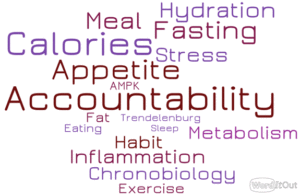In my third installment of findings from Dr. Michael Greger’s How Not To Diet: The Groundbreaking Science of Healthy, Permanent Weight Loss, I’ll briefly summarize his weight loss boosters to help win the battle of the bulge.
 Accountability: Group therapy, health coaches, and social support produce better results than going it alone. At a bare minimum, weigh yourself regularly to stay focused on your weight loss goals.
Accountability: Group therapy, health coaches, and social support produce better results than going it alone. At a bare minimum, weigh yourself regularly to stay focused on your weight loss goals.
Amping AMPK: An AMP-activated protein kinase causes the body to switch from storing to burning fat. It also stimulates production of mitochondria, the energy engines inside our cells. Eat nightshade vegetables (bell peppers, eggplant, tomatoes), barberries, and up to 2 tablespoons vinegar daily.
Appetite Suppression: Ground flaxseed, cumin, and black cumin naturally tamp down our appetites.
Chronobiology: Take advantage of our body’s circadian rhythms by eating when we’re most likely to process food efficiently. The rule of thumb is: Eat breakfast like a king, lunch like a prince, and dinner like a pauper. And don’t snack at night!
Eating Rate: It takes ~20 minutes after we start eating for the brain to put the brakes on our appetites. Eat slowly. Opt for solid foods that require chewing. Even the sensations in the mouth can translate into the sensation of physical fullness. Ergo, nibble and savor rather than chomp and gulp!
Exercise Tweaks: As noted in a prior post, adjusting one’s diet is a far more effective strategy for weight loss than relying on exercise (although exercise confers many other benefits). Choose activities that you genuinely enjoy so that you will be less tempted to reward yourself with culinary treats for doing it.
Fat Blockers: Thylakoids in greens delay fat absorption and decrease ghrelin, the hunger hormone. Superstars include kale, collards, and arugula.
Habit Formation: Build healthy habits so that good food choices (not bad ones!) become automatic. Be intentional every time you put food in your mouth. Don’t eat on autopilot.
Hydration: Substitute water for sugary beverages. Drink filtered water to avoid impurities.
Inflammation Quenchers: Adopt a whole food plant-based diet to maximize anti-inflammatory food substances. Try goji berries (wolf berries); they have four times the antioxidants as other dried fruits. Add turmeric and nutritional yeast to your diet.
Intermittent Fasting: Front-end load calories every day; “fast” every evening after an early dinner. This practice has been associated with lower inflammation, better blood sugar, and improved weight maintenance.
Meal Frequency: The more frequently people eat, the more weight they tend to gain. Break the snacking habit and/or make it really inconvenient to do so.
Metabolic Boosters: Drinking 2 cups of (plain) water boosts the metabolism; doing so four times daily can wipe out 100 calories! Cold water takes more energy to process than warm water. Limit consumption to no more than 3 cups per hour to avoid overload on the liver.
Mild Trendelenburg: Drinking extra water also causes our blood capacity to expand which induces the heart to release atrial natriuretic factor (ATF), a fat burning hormone.
Negative Calorie Preloading: If you drink 2 cups of water or 1 cup of water-rich vegetables before a meal, you tend to eat less during the meal. Apples and grapefruits can produce the same effect, but other fruits did not pass muster. (The sweetness may be an appetite stimulant.)
Sleep Enhancement: When we sleep too little, we tend to crave unhealthy foods and gain weight. Excess weight can be a deterrent to a good night’s sleep due to indigestion, sleep apnea, or physical discomfort. Aim for 7 hours per night of sleep.
Stress Hormone Relief: Much like sleep deprivation, stress is associated with weight gain. (They don’t call it “comfort food” for nothing!) Stress-induced weight gain tends to lodge in the belly – the worst place for it! Remedies include exercise, laughter, yoga, massage, and mindfulness-based stress relief (MBSR).
Wall Off Your Calories: When eating whole foods and whole grains, calories get trapped in their cell walls. It passes through our elimination channel and never makes it inside us. So, that’s an easy way to limit caloric intake. So, for example, choose raw, unprocessed almonds instead of almond butter, or whole grains instead of a slice of whole wheat bread!